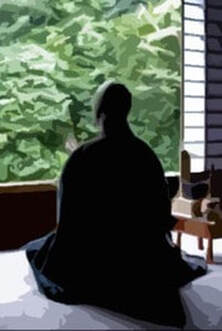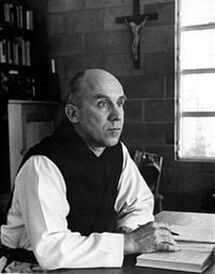a few thoughts on zen and christianity
|
It is a fair question to ask: Why would a Christian be interested in also practicing Zen Buddhism?
It’s also fair to ask: Is this even possible? Or What could a Christian possibly gain from seeking wisdom outside one’s own tradition? My own experience confirms that not only is it possible for a Christian to practice Zen Buddhism, it is integral to do so. In fact, I find it necessary... |
Much of Christian theology and practice, especially in the context of worship and liturgy, is focused on providing answers to the question "How is God/Christ present in us, in the world, or in the church, or in the Bread and Wine of Communion."
Zen practice invites us to ask a different but much more vitally important question: "How are YOU being present?"
Throughout my lifetime of Christian practice, beginning in childhood, I've always understood the Christian life to be a journey of healing, Divine Love, and transformation. On this transformative journey we are called to become as St. Paul says "A New Creation." And then I began to wonder: "How can I be fully transformed if I am not fully present in the process of healing and transformation?" As a young man, I discovered the practice of Zen. After directly experiencing the practice of Zen practice and Zen meditation (something I've done for almost 30 years), I came to understand that infusing Zen into my spiritual life is the answer to the question of how to be fully present in the process of transformation.
Paul Knitter, author and theologian entitled his best-selling book: Without Buddha, I Could Not Be a Christian...this is true for me, too.
Zen practice invites us to ask a different but much more vitally important question: "How are YOU being present?"
Throughout my lifetime of Christian practice, beginning in childhood, I've always understood the Christian life to be a journey of healing, Divine Love, and transformation. On this transformative journey we are called to become as St. Paul says "A New Creation." And then I began to wonder: "How can I be fully transformed if I am not fully present in the process of healing and transformation?" As a young man, I discovered the practice of Zen. After directly experiencing the practice of Zen practice and Zen meditation (something I've done for almost 30 years), I came to understand that infusing Zen into my spiritual life is the answer to the question of how to be fully present in the process of transformation.
Paul Knitter, author and theologian entitled his best-selling book: Without Buddha, I Could Not Be a Christian...this is true for me, too.
“The true purpose of Zen is to see things as they are, to observe things as they are, and to let everything go as it goes. Zen practice is to open up our small mind”.
~Zen Master Shunryu Suzuki Roshi
Author of Zen Mind, Beginner's Mind
~Zen Master Shunryu Suzuki Roshi
Author of Zen Mind, Beginner's Mind
what is zen?
|
The word Zen derives from the Japanese pronunciation of the Chinese word Chán, a form of meditation practice that arose in China during the 6th century. This particular form of Buddhist practice emphasizes meditation, or Zazen. Zen is a part of the Mahayana tradition of Buddhism that spread through China, Korea, Japan, Southeast Asia. This tradition emphasizes meditation as it's primary spiritual practice along with the cultivation of compassion and practicing deep mindfulness.
In her book Zen for Christians; a Beginners Guide, Kim Boykin explains Zen this way: “Zen is not about doctrine or beliefs. It’s not about worship or devotion. Zen is not theistic, but it isn’t atheistic either, or even agnostic. Zen simply doesn’t address the subject of God. In Zen, the Buddha is not understood to be a god or messiah or superhuman but an ordinary human being who discovered a way of liberation from suffering and taught this way to others.” |
Boykin goes on to say…
“Zen is a way of liberation from suffering – both the suffering we experience ourselves, and the suffering we cause others. It is a practical and experiential tradition, centered in a form of meditation that can be practiced by people of any or no religion. Zen practice is about opening compassionate awareness to all of reality and realizing that the joy and freedom we long for are available right here, right now, in the midst of the messiness and pain and confusion of our lives.”
“Zen is a way of liberation from suffering – both the suffering we experience ourselves, and the suffering we cause others. It is a practical and experiential tradition, centered in a form of meditation that can be practiced by people of any or no religion. Zen practice is about opening compassionate awareness to all of reality and realizing that the joy and freedom we long for are available right here, right now, in the midst of the messiness and pain and confusion of our lives.”
“To study Zen is to study the self, to study the self is to forget the self, to forget the self is to be awakened in the ten-thousand things.”
~Zen Master Eihei Dogen
Author of Fukanzazengi
~Zen Master Eihei Dogen
Author of Fukanzazengi
thomas merton and interspiritual work
|
Cistercian monk and prolific author Thomas Merton (familiar to and admired by many!) was a pioneer in inter-spiritual dialogue. After travelling to Asia and encountering Zen Buddhist practice first hand, Meeton had this to say in his book Zen and the Birds of Appetite:
“Buddhist meditation, but above all that of Zen, seeks not to explain but to pay attention, to become aware, to be mindful, in other words to develop a certain kind of consciousness that is above and beyond deception by verbal formulas – or by emotional excitement. Deception in what? Deception in its grasp of self as it really is. Deception due to diversion and distraction from what is right there – consciousness itself.” |
Furthermore, Merton says:
“Zen is not an idealistic rejection of sense and matter in order to ascend to a supposedly invisible reality which alone is real. The Zen experience is a direct grasp of the unity of the invisible and the visible, the noumenal and the phenomenal, or, if you prefer, an experiential realization that any such division is bound to be pure imagination.”
“Zen is not an idealistic rejection of sense and matter in order to ascend to a supposedly invisible reality which alone is real. The Zen experience is a direct grasp of the unity of the invisible and the visible, the noumenal and the phenomenal, or, if you prefer, an experiential realization that any such division is bound to be pure imagination.”
“After all, it is in the depths of conscious that God speaks, and if we refuse to open up inside and look into those depths, we also refuse to confront the invisible God who is present within us. This refusal is a partial admission that we do not want God to be God any more than we want ourselves to be our true selves.”
~ Thomas Merton
Author of Zen and the Birds of Appetite
~ Thomas Merton
Author of Zen and the Birds of Appetite
other christian/zen teachers
|
Robert Kennedy Roshi is a Jesuit Priest of the Roman Catholic tradition and Zen teacher, ordained in the Zen lineage of Taizan Maezumi Roshi. In his book Zen Gifts for Christians, Kennedy suggests that people, leading toward a deeper form of prayer are often attracted to studying Zen. Not because they wish to become Buddhists, but because they seek a more contemplative prayer life. Kennedy writes:
"Zen gives us a method to put contemplation into practice. Zen Training does not allow us to analyze or theorize about prayer or life. Instead, [Zen] plunges us at the outset into the contemplative act." When we are able to bring our mindfulness to all that we do: work, play, participate in worship, create, rest, cook, clean...then Zen practice becomes a way to "pray without ceasing". |
“Just as a flower is made only of non-flower elements, Buddhism is made of non-Buddhist elements, including Christian ones, and Christianity is made of non-Christian elements, including Buddhist ones. We have different rots, traditions, and ways of seeing, but we share the same common qualities of love, understanding, and acceptance.”
~ Thich Naht Hanh
Author of Living Buddha, Living Christ
~ Thich Naht Hanh
Author of Living Buddha, Living Christ
I offer this exploration of Zen to illumine several important concepts of inter-spiritual practice. Zen is not a religion of belief as Christianity may be understood (or perhaps misunderstood!). Rather, Zen is primarily a spiritual practice open and available to all, regardless of their spiritual tradition. Zen is a deeply intimate practice of looking closely at ourselves, looking closely at suffering and the world, and looking closely at our relationship to suffering and at our relationships to others. Zen is certainly not a "religion" to which one "converts," abandoning one's Christian tradition. Zen is simply a way of being. Zen is a practice that deepens and compliments one's own spiritual practice.
Zen is a practice of cultivating compassion in response to the suffering in ourselves, within others, and in the world. Zen is a practice of nurturing right relationship with this suffering.
Zen is a practice of cultivating mindfulness of our thoughts, words, and actions and mindfulness of the ways in which we relate to our neighbor and the world around us. Through mindfulness we learn to be fully present with ourselves, our neighbor, God, and reality as it is. With mindfulness, we discover the interconnectedness of life. By being fully present, we open ourselves to the process of alchemy and transformation.
Zen is a practice of cultivating compassion in response to the suffering in ourselves, within others, and in the world. Zen is a practice of nurturing right relationship with this suffering.
Zen is a practice of cultivating mindfulness of our thoughts, words, and actions and mindfulness of the ways in which we relate to our neighbor and the world around us. Through mindfulness we learn to be fully present with ourselves, our neighbor, God, and reality as it is. With mindfulness, we discover the interconnectedness of life. By being fully present, we open ourselves to the process of alchemy and transformation.
If you are interested in experiencing Archetypal Coaching;
Or if you have questions about the practice of meditation;
Or if you have questions regarding individual or group dream work;
Or if you would like to schedule a class, workshop or retreat;
Please visit the CONTACT page and send me an e-mail.
Or if you have questions about the practice of meditation;
Or if you have questions regarding individual or group dream work;
Or if you would like to schedule a class, workshop or retreat;
Please visit the CONTACT page and send me an e-mail.



